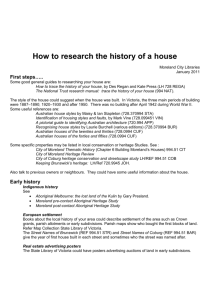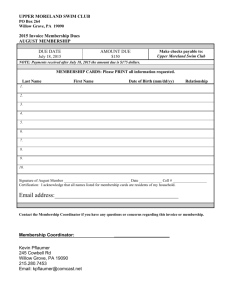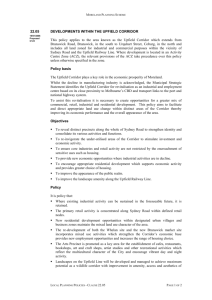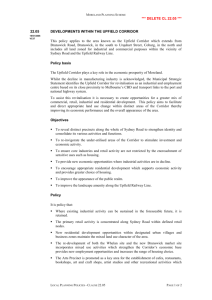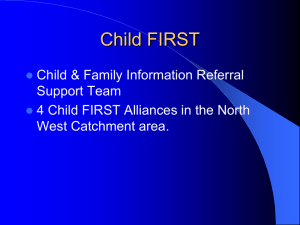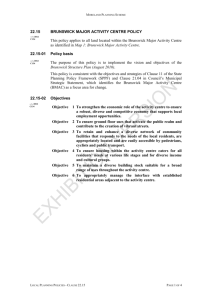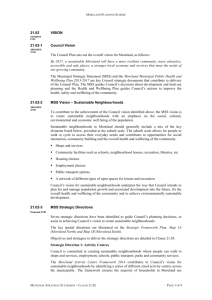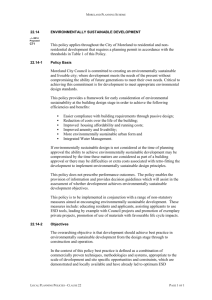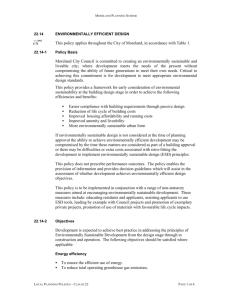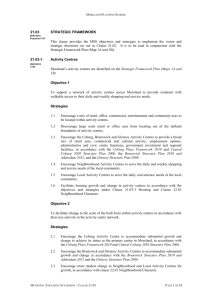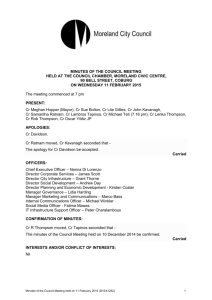SCHEDULE TO THE MIXED USE ZONE
advertisement
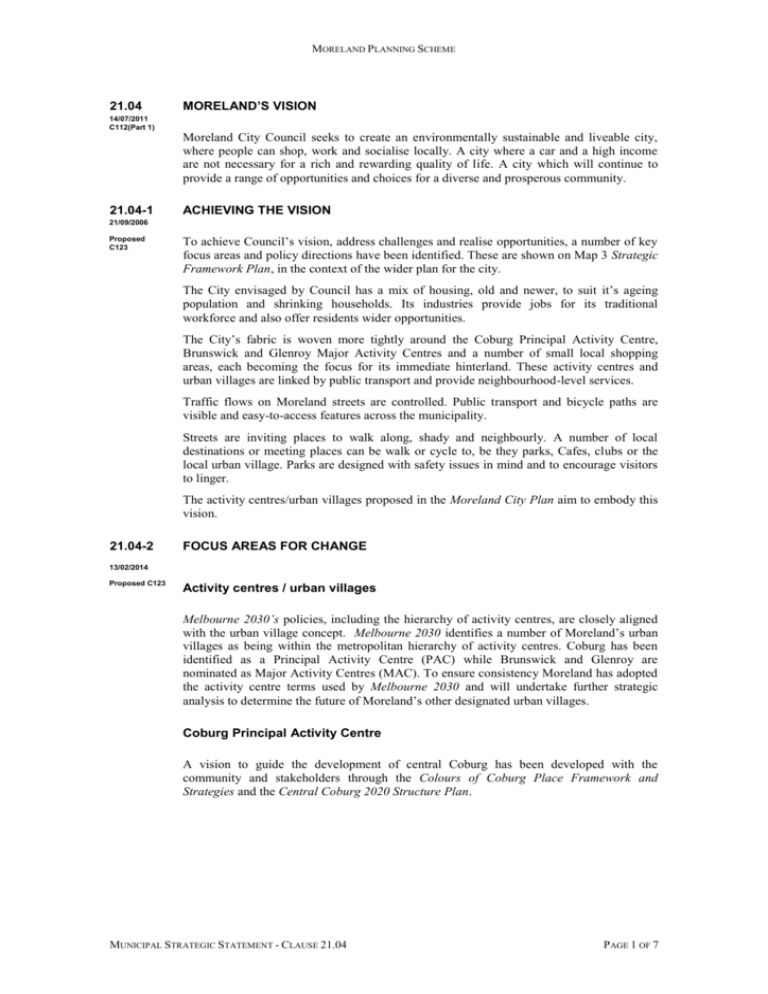
MORELAND PLANNING SCHEME 21.04 MORELAND’S VISION 14/07/2011 C112(Part 1) Moreland City Council seeks to create an environmentally sustainable and liveable city, where people can shop, work and socialise locally. A city where a car and a high income are not necessary for a rich and rewarding quality of life. A city which will continue to provide a range of opportunities and choices for a diverse and prosperous community. 21.04-1 ACHIEVING THE VISION 21/09/2006 Proposed C123 To achieve Council’s vision, address challenges and realise opportunities, a number of key focus areas and policy directions have been identified. These are shown on Map 3 Strategic Framework Plan, in the context of the wider plan for the city. The City envisaged by Council has a mix of housing, old and newer, to suit it’s ageing population and shrinking households. Its industries provide jobs for its traditional workforce and also offer residents wider opportunities. The City’s fabric is woven more tightly around the Coburg Principal Activity Centre, Brunswick and Glenroy Major Activity Centres and a number of small local shopping areas, each becoming the focus for its immediate hinterland. These activity centres and urban villages are linked by public transport and provide neighbourhood-level services. Traffic flows on Moreland streets are controlled. Public transport and bicycle paths are visible and easy-to-access features across the municipality. Streets are inviting places to walk along, shady and neighbourly. A number of local destinations or meeting places can be walk or cycle to, be they parks, Cafes, clubs or the local urban village. Parks are designed with safety issues in mind and to encourage visitors to linger. The activity centres/urban villages proposed in the Moreland City Plan aim to embody this vision. 21.04-2 FOCUS AREAS FOR CHANGE 13/02/2014 Proposed C123 Activity centres / urban villages Melbourne 2030’s policies, including the hierarchy of activity centres, are closely aligned with the urban village concept. Melbourne 2030 identifies a number of Moreland’s urban villages as being within the metropolitan hierarchy of activity centres. Coburg has been identified as a Principal Activity Centre (PAC) while Brunswick and Glenroy are nominated as Major Activity Centres (MAC). To ensure consistency Moreland has adopted the activity centre terms used by Melbourne 2030 and will undertake further strategic analysis to determine the future of Moreland’s other designated urban villages. Coburg Principal Activity Centre A vision to guide the development of central Coburg has been developed with the community and stakeholders through the Colours of Coburg Place Framework and Strategies and the Central Coburg 2020 Structure Plan. MUNICIPAL STRATEGIC STATEMENT - CLAUSE 21.04 PAGE 1 OF 7 MORELAND PLANNING SCHEME The vision for the Coburg Principal Activity Centre is: Central Coburg develops as the prime shopping, living, employment and activity centre in Moreland. The Centre is transformed into an attractive system of safe streets and spaces. Central Coburg becomes a sought after living environment, offering a range of housing choices, including high density housing. Most people arrive at the centre on foot, by bike, or by public transport. The provision of a range of services enables people to conduct a number of different activities based on the one trip. Central Coburg is linked with networks of green spaces. The Pentridge redevelopment provides an exciting component of the activity centre. Council will continue to work with the developers of the site to create a successful, integrated and seamless activity centre for Moreland. The Coburg Principal Activity Centre will enable the strengthening of leisure, community, entertainment and civic functions for all Moreland citizens. Figure 1: Coburg Principal Activity Centre boundary MUNICIPAL STRATEGIC STATEMENT - CLAUSE 21.04 PAGE 2 OF 7 MORELAND PLANNING SCHEME Major activity centres Further strategic work is required define the boundaries and roles of the Brunswick and Glenroy Major Activity Centres. Urban villages Council’s vision, to create an environmentally sustainable and liveable city, where people can shop, work and socialise locally, is captured in the concept of urban villages. The name ‘urban village’ has been given to local urban activity centres based around good public transport links, which have a mix of residential development, employment and open space. Urban villages can provide a range of local services and encourage a lively and active community. The designated urban villages are: Merlynston Station Anstey Station Brunswick Station Jewel Station Nicholson Street/Brunswick Road Grantham St/Union St Lygon St/Albion St Pascoe Vale Station Hadfield (West Street) Cumberland Road/Gaffney St Lygon St/Albert St Nicholson/Blyth St Melville Rd/Victoria St Holmes St/Moreland Road Moreland Road/Melville Road Nicholson Street/Glenlyon Road Map 3 Strategic Framework Plan shows the location of Moreland’s activity centres and urban villages. Upfield corridor The Upfield corridor includes a series of nodes of activity. The pattern of mixed use and business zones reflects this with a conscious encouragement of a greater mix of activities and higher density housing at urban village locations. The industrial and commercial strip of land along the Upfield railway line has declined in manufacturing importance. Council is keen to support increased service and improved facilities along the line. Based on its proximity to the CBD and Sydney Road, this area is considered suitable for revitalising as an industrial and employment centre. The recent Moreland Industrial Land Use Strategy confirmed the industrial role of land in the area. Its future role as an employment generating core for the municipality will be explored as part of future planning for Brunswick. MUNICIPAL STRATEGIC STATEMENT - CLAUSE 21.04 PAGE 3 OF 7 MORELAND PLANNING SCHEME As part of the Upfield revitalisation program, Council is applying a range of zones to enable a broader range of activities and investments in strategic locations such as urban villages and the Brunswick Arts Precinct. This revitalisation strategy will be assessed as part of future planning for Brunswick. Sydney Road Sydney Road is probably the best known feature of Moreland and is significant as one of Melbourne’s great Victorian retail streets, along with Smith Street, Chapel Street, and Bridge Road. Sydney Road had its origins as the main route to the northern goldfields. Many grand theatres and large establishments were located along it and many fine examples of architecture remain in the number of churches and 19th century retail buildings of two, three, and four storeys. In more recent times, the integrity of this premier retail street has been eroded. Gaps and irregular setbacks now break the rhythm of the street frontages. Bringing back the former glory of Sydney Road by drawing from its high heritage value could have tremendous impact on the way residents, visitors and businesses think about the area and about Moreland in general. Ensuring Sydney Road’s continued success as the municipality’s social and economic heart is a key part of Council’s land use strategy. . To boost the road’s diverse and distinct shopping and social activity, Council has commenced a program of improvements along Sydney Road, including streetscape works, making it more conducive to pedestrians and cyclists, improving facades and attracting retail development. Council is working with VicRoads to investigate ways to maintain through-traffic and, at the same time, to improve tram travel times, and safety and amenity for cyclists and pedestrians, and to provide opportunities for streetscape improvements. Arts precinct The arts play a vital role in the life and vitality of this municipality. Council is keen to develop an ‘arts precinct’ around the Brunswick Town Hall as the focus for arts and cultural activities in the southern part of the city. This precinct will include the Counihan Gallery in Brunswick and also the Mechanics Institute as a performing arts venue. Urban improvements in this part of Sydney Road will complement the arts theme. Opportunities for further expansion of the precinct and economic development opportunities should be explored as part of future planning for Brunswick. Retail centres The Coburg Principal Activity Centre and the Major Activity Centres of Brunswick and Glenroy, with excellent transport facilities and complementary civic, community and convenience services, provide higher order shopping and entertainment opportunities. In conjunction with additional housing, these areas will enhance their status as Moreland’s Principal and Major Activity Centres. Moreland’s urban villages also provide the infrastructure to sustain basic convenience shopping within walking distance of most residential areas. Council will continue its strong support for the many strip and local shopping centres in the municipality. Industry and Employment Moreland is the home to some major industrial companies. As many traditional industries still remain, the industrial land supply must be carefully managed to ensure their continued operation and protection from competing residential activities. MUNICIPAL STRATEGIC STATEMENT - CLAUSE 21.04 PAGE 4 OF 7 MORELAND PLANNING SCHEME Council aims to attract and keep industry in Moreland with a special focus on attracting environmentally sustainable industries and protecting the textile, clothing, footwear, food processing and vehicle components industries. However, there is a significant forecast growth in non industrial employment activities related to retail, professional and managerial businesses and services. Council will facilitate the use of inappropriately located or underutilised industrial land for other new employment activities. Council has identified a series of strategic categories to guide the future use and development of industrial land. These categories include Core and Secondary Industry and Employment, Multi Use - Employment, Multi Use - Residential and Transition-Residential. Core and Secondary Industry and Employment Areas are intended to protect concentrations of industry that are relatively unconstrained by residential or other sensitive uses for long term industrial use. Multi Use - Employment Areas have been identified to accommodate a wider mix of employment opportunities, including a mix of industry and offices and other employment generating uses. Multi Use - Residential Areas have been identified to evolve from previous industrial uses to a mix of office, retail, residential and other compatible uses. Transition-Residential Areas have been identified to evolve from previous industrial uses to medium density residential use. Transport issues Transport is a means to an end. It can have lesser or greater environmental consequences to the point where quality of life can be seriously eroded. Congestion, pollution and other environmental impacts of car and truck travel are detrimental to living conditions. Council imagines a city where people choose to make their shorter trips (5 to 7 kilometres) by public transport, walking or cycling. The Moreland Integrated Transport Strategy 1998 proposes moving a significant proportion of travel away from cars and trucks to trams, trains, buses, bicycles and footpaths. This will be integrated with urban planning by clustering development near transport corridors, providing easier pedestrian and cycling access in existing and new street layouts, and in the design and management of space in strip shopping centres. The broad aim is for the most convenient, and therefore the most used, mode of transport to be the best for the environment, the community and the economy. One way to demonstrate better transport planning will be to take advantage of some of the opportunities posed by the local freeway network. Council would like to see more through traffic shifted to the freeway system and to see no significant increase in traffic on the arterial roads system. While significant increases are projected for car travel across Melbourne, Council will challenge the need for arterial road widening and the retention of major widening opportunities in the planning scheme. Council recognises the limits of its influence over the wider transport network. It will continue to develop partnerships and working relationships with other groups and organisations in the different transport networks. Great opportunities exist in revitalised mass transit on trams and trains run by private sector operators. Council will advocate the need for a metropolitan shift in transport policy away from car dependence. Waterways Historically, the network of waterways and associated open space has been treated only as a drainage and floodway system. Today, waterways need to be viewed and managed in ways that recognise their broader ecological functions. The continued revegetation and regeneration of the Moonee Ponds and Merri Creeks provide significant opportunities for improving the liveability and environmental sustainability of Moreland. These parkland corridors will be enhanced by continued landscape and revegetation work and protected by appropriate development controls. Council supports the work of cooperative agencies and programs for planning and developing these creeks. MUNICIPAL STRATEGIC STATEMENT - CLAUSE 21.04 PAGE 5 OF 7 MORELAND PLANNING SCHEME These corridors can be strengthened by better urban development along their margins, in particular, with new housing which faces the parkland and gives a sense of safety and activity. The waterways can be less polluted with litter and industrial waste. As such, the current focus on stormwater management is on measures to store and retain stormwater, trap and remove gross pollutants, and improve the quality of stormwater discharged to receiving waterway environments. The waterway parklands also help build a network of activities and destinations that can be reached on foot or by bicycle, integrated into the wider municipality. The Centre for Education and Research in Environmental Strategies (CERES) Environmental Park in Brunswick East, for example, combines the mutual advantage of Merri Creek parkland with activities like a Cafe, children’s farm and education centre. MUNICIPAL STRATEGIC STATEMENT - CLAUSE 21.04 PAGE 6 OF 7 MORELAND PLANNING SCHEME Map 3: Strategic Framework Plan Note: This map shows simplified information only. Please refer to planning scheme maps and detailed policies for precise boundaries. MUNICIPAL STRATEGIC STATEMENT - CLAUSE 21.04 PAGE 7 OF 7

